Climate change. The dreaded two words we all seem to be both equally scared and ignorant of. It’s happening. Rapidly. Nations all over the world have gathered in Glasgow for the past two weeks to form an action plan to tackle the crisis and our dreaded carbon emissions. 200 countries with one common goal of saving the planet.
The primary focus of the meeting is to approach new ways in reducing global warming to the perhaps ambitious but nonetheless achievable 1.5 degrees by 2030, as was agreed on in the 2015 Paris agreement. Studies have shown that to achieve this goal by 2030 emissions need to be cut by 45% globally.
So, what’s being enforced at cop26 that means we can actually achieve this goal? What new targets and policies are being made?
I think it’s worth noting that while participation is perhaps one of the largest ever, showing the potential eagerness of countries to make active change; the policies being made are, in general, not legally binding and countries therefore only have the moral, not legal, responsibility to carry out the pledges they make. This self-delegation is core to ensuring the effectiveness of the changes being made, which is why charities like extinction rebellion and Greenpeace are pivotal in the change. Their activism puts social pressure on the governments which manifest in political policy change and the carrying out of their promises made in COP26.
Some of the main policies made so far have been made regarding deforestation, methane reduction and coal consumption. As well as this, the US and China have signed an agreement of climate change action cooperation. Being the two biggest emitters of carbon emissions into the atmosphere, their cooperation and dedication to the cause is pivotal in ensuring the promises made in Paris in 2015 are met, in addition to the pledges being made now in 2021.
Over 100 countries making up 85% of the world’s forests have signed an agreement which pledged to stop deforestation by 2030. One of these countries was Brazil, who previously in 2014 refused to sign a similar pledge that aimed to half deforestation by 2020. Moreover, 28 countries also pledged to tackle deforestation for food/ cosmetic consumption i.e., the production of palm oil, soya and cocoa. Indonesia, a key contributor to the palm oil trade signed this pledge.
As for methane, 100 countries have signed a pledge wanting to cut emissions by 30%. Methane is a byproduct of Cattle production and waste disposal so it’s likely we will see new ways of recycling as well as the rethinking of waste reduction with new innovative methods of packaging and promotion of waste consciousness.
Coal consumption is being heavily disputed in meetings but currently, 40 countries, noticeably not the US signed a pledge to move industry away from coal. While this pledge didn’t include other fossil fuels such as oil, we’re likely to see a rise and focus on renewable energy sources. It should be noted again however that the US and 20 others signed a pledge to stop public funding of “unbated” fossil fuels, “unbated’ meaning coal burning without capture and storage of carbon so it goes directly into the atmosphere.
COP26 proves to be promising in its proposals but will individuals deliver? Countries and those in charge continue to make promises they don’t deliver on and the COP and its publicity will hold them accountable for their promises. The scientific research is damning. It’s action now or never. The reality of climate change is sinking in, and I don’t like our bets on our future without the follow-through commitments of those in charge.


